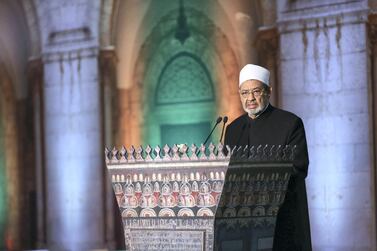Cancel culture is stopping young Muslims from engaging in constructive dialogue and learning from people with different opinions, a conference in Abu Dhabi heard on Sunday.
Yusuf Lenfest, a master of theological studies candidate at Harvard Divinity School in the US, told the First Global Forum of Muslim Youth that young faithful were too quick to disregard differing views, to their disadvantage.
“Today you find there are social waves and sometimes something will catch on and become a trend on social media," Mr Lenfest said.
"Then it disappears because, when they disagree with something you say, they say ‘You are cancelled’.”
Cancel culture is a form of boycott or shaming in which a person is thrust out of a social circle, either in the real world but most commonly on social media, after being criticised for a certain type of behaviour or viewpoint.
“That is not really the way to go forward,” Mr Lenfest said. “Young people need to understand that older people do have experience and wisdom, and they really want to see a better future.”
The three-day forum, which ended on Sunday, gathered Muslim scholars and experts from around the world to discuss pressing issues in their societies and to consider solutions.
Discrimination, poverty and uncertainty in applying Islamic laws or principles in non-Muslim societies were identified as among the top issues facing the young faithful today.
Mr Lenfest said Islamophobia continued to be the Muslim world’s biggest challenge overall.
“If a Muslim commits a crime [outside the Muslim world], Islam is blamed," he said.
"If a non-Muslim commits a crime, he is perceived as having mental health issues."
Mr Lenfest said the young were also struggling to accept differing opinions from within the Muslim community.
“It is inevitable to have disagreements among communities but as long as they are not contradicting with the fundamentals of religion it is OK.”
He said disagreement on religious specifics led radical groups such as ISIS to attack both Muslim and non-Muslim communities.
“There will be disagreements in the branches of Islamic science, so agreeing to disagree” is key, Mr Lenfest said.
The forum heard that Muslim laws must be fitted to suit the societies in which they are being applied as to avoid confusion, which may drive youths to adopt outdated or incorrect ideas.
“Now Europe is part of the Muslim world but every place has different legislation and scholars need to formulate what is good for that community,” said Dr Islam Uddin, an imam and lecturer at Academy Islamia, a private institute in London.
“Muslim youth we have today are mostly fourth-generation Muslims. They have lost some links to their origins.
"They may have lost their language and some practices but they have the feeling that they need to do something related to their original nature.”
If it is not clear how they can do that, in accordance with the non-Muslim societies they live in, they may follow misconceptions, Dr Uddin said.
"And that could cause a problem."







